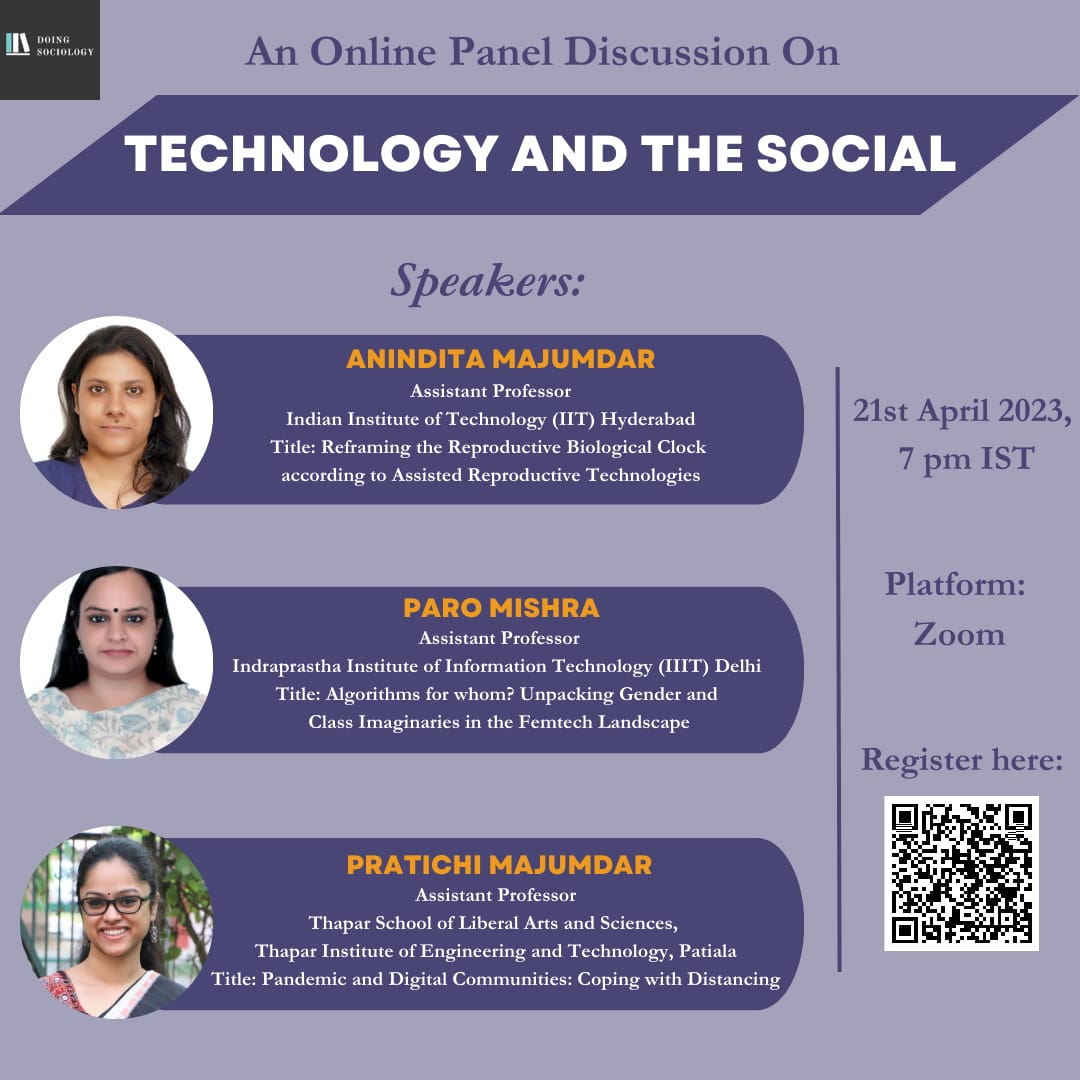Technology is a fast-paced domain. New innovations are piloted every day in a desperate attempt to sell what the masses will buy – tools to make our daily lives easier. As older generations warm to the idea of utilising technology, we move eerily closer to a world where social interaction is primarily digital. But how should we look at these changes? Will human interaction strengthen or suffer as a result of new communication technologies?
Through this panel discussion titled ‘Technology and the Social’, we wish to explore different facets of this relationship between the two. We have three fabulous young women speakers who will help us throw light on some of these aspects.
Speakers include:
Dr Anindita Majumdar is an Assistant Professor at the Department of Liberal Arts, Indian Institute of Technology (IIT) Hyderabad. She is speaking on Reframing the Reproductive Biological Clock according to Assisted Reproductive Technologies. She has been researching on commercial surrogacy, kinship and infertility since 2010. Her book based on her ethnographic research was published in 2017 by Oxford University Press (OUP), and is titled Transnational Commercial Surrogacy and the (Un)Making of Kin in India. The book was based on her doctoral research, and was awarded the ‘Distinction in Doctoral Research Award’ in 2016 by the Indian Institute of Technology Delhi. The monograph was also shortlisted for the Bloomsbury London School of Economics (LSE) Social Anthropology Monograph Award 2016. Anindita was invited to contribute to the Oxford India Short Introductions Series on Surrogacy, which was published in 2019. She is currently researching and writing on the linkages between ageing and assisted reproductive technologies in India: including fieldwork in North India amongst post-menopausal couples who became pregnant through the use of assisted reproductive technologies. The research was funded by Wellcome UK, along with a parallel research on the biological clock and infertility treatment in South India supported by the Indian Council for Social Science Research (ICSSR). Recently, Anindita has co-edited and edited five special issues on kinship, population and reproductive ageing with Contemporary South Asia, Anthropology and Aging, Asian Journal of Women’s Studies, Reproductive Biomedicine and Society Online and Asian Bioethics Review. She is on the international advisory board of the journal Medicine, Anthropology, Theory, and is an external member of Center for Reproductive Health (CORTH) at the University of Sussex. Currently, she is Global Visiting Fellow, 2022-23 at the Department of Social Sciences and Public Policy at King’s College London.
Dr Paro Mishra teaches at the Department of Social Sciences and Humanities at Indraprastha Institute of Information Technology (IIIT) Delhi. Her core research interests lie at the intersection of Gender and Technology – New Reproductive Technologies (NRTs) and Information/ Digital Technologies, in particular. She has published on intimate migrations, masculinity, ageing, care circulation, care work and gendered surveillance. Paro has received several fellowships and grants from the Netherlands Institute for Advanced Studies, University Grants Commission, Indian Institute of Information Technology (IIT) Delhi and the Indian Council of Social Science Research (ICSSR). She has recently finished a project on sex-selective technologies, male marriage squeeze and cross-cultural intimacies funded by the Indian Council of Social Science Research (2018). Her current research is examining intersections of Gender, Health and Digital Technologies with a focus on emerging FemTech Landscape in India. This project is funded by IIITD-IITD MFIRP Scheme and by ICSSR. She is speaking on Algorithms for whom? Unpacking Gender and Class Imaginaries in the Femtech Landscape.
Dr Pratichi Majumdar is teaching at the Thapar School of Liberal Arts and Science, Patiala. Her doctoral thesis is titled ‘Storytelling on the Internet: A Sociological Study of Popular English and Hindi Webseries’. Her areas of academic interest include Digital Sociology, New Media and Popular Culture, Sociology of Technology, Sociology of Development, and Gender and Human Rights. In the past few years, her specialization has been in using a combination of ethnographic and cyber-ethnographic research methods to sociologically study both physical and virtual communities. Pratichi is part of the ESRC funded GendV Project: Urban Transformations and Gender Violence in India and South Africa, based at the University of Cambridge as a Post-Doctoral Research Associate since 2020. She has previously taught at the Sri Venkateswara College, University of Delhi and the Manav Rachna International Institute of Research and Studies to undergraduate and post-graduate students. She has also worked on various research projects around issues of gender, media, online communities, markets and identities, independently and with various organisations including the National Human Rights Commission, Kerala Institute of Local Administration, Human Rights Law Network among others. She has presented and published her work at several national and international forums. The title of her talk is Pandemic and Digital Communities: Coping with Distancing.
